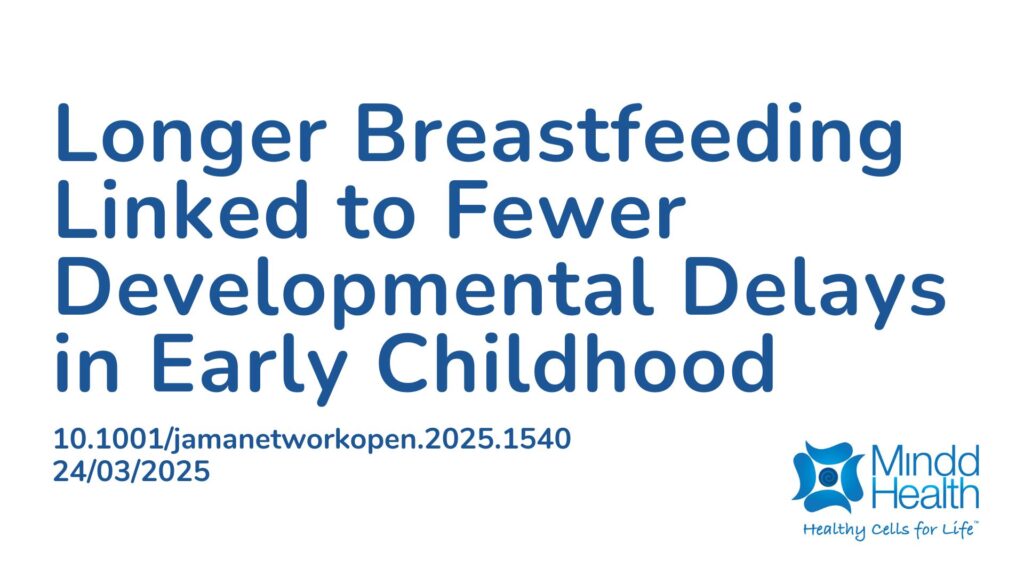Summary:
The World Health Organization suggests exclusive breastfeeding for the first 6 months of life, followed by breastfeeding alongside healthy foods for up to 2 years or more. Past studies have linked breastfeeding with better cognitive development in children, but not all research has considered factors that influence breastfeeding rates such as family income, access to postnatal education, complicated births, prematurity, and newborn illnesses. These factors can also affect how well babies breastfeed and develop in the long term. This study, involving 570,532 children, examined how the length of breastfeeding affects child development in babies born between 35 and 42 weeks of pregnancy. Researchers used data from routine child check-ups and national health records. The results showed that babies who were breastfed for at least 6 months, especially exclusively (without formula), were less likely to have delays in language, movement, and social skills compared to those breastfed for a shorter time. This held true even when comparing siblings in the same family. In conclusion, the study found that longer or exclusive breastfeeding is linked to fewer developmental delays and neurodevelopmental issues. These findings may support parents, caregivers, and public health programs in promoting healthy early childhood development.
Abstract:
Importance: Detecting and addressing potentially modifiable factors associated with healthy development is key to optimizing a child’s potential. When investigating the outcomes of child development, it is important to account for disparities in feeding practices and avoid confounding bias. Objectives: To estimate the independent association between breastfeeding and attainment of developmental milestones or neurodevelopmental conditions. Design, Setting, and Participants: This retrospective cohort study used data from a national network for routine child development surveillance in Israel linked with national social insurance financial entitlements for neurodevelopmental deficiencies. Participants were children born between January 2014 and December 2020 after at least 35 weeks’ gestation without severe morbidity and with at least 1 follow-up surveillance visit at 2 to 3 years of age. Outcome data were collected in March 2023. Exposures: Duration and exclusivity of breastfeeding in infancy. Main Outcomes and Measures The primary outcomes were delays in attainment of developmental milestones and diagnosis of prespecified neurodevelopmental conditions. Multivariable regression, matching, and within-family analyses were used to estimate adjusted odds ratios (AORs) after accounting for potential confounding factors related to the child (gestational age, birth weight, multiple gestation, and child order in the family) and mother (age, socioeconomic status, educational level, marital status, employment, nationality, and postpartum depression). Results: Of 570 532 children (291 953 [51.2%] male), 20 642 (3.6%) were preterm, 38 499 (6.7%) were small for gestational age, and 297 571 (52.1%) were breastfed for at least 6 months (123 984 [41.7%] were exclusively breastfed). Children who were breastfed for at least 6 months exhibited fewer delays in attaining language and social or motor developmental milestones compared with children exposed to less than 6 months of breastfeeding (AOR, 0.73 [95% CI, 0.71-0.76] for exclusive breastfeeding; AOR, 0.86 [95% CI, 0.83-0.88] for nonexclusive breastfeeding). Among 37 704 sibling pairs, children who were breastfed for at least 6 months were less likely to demonstrate milestone attainment delays (OR, 0.91 [95% CI, 0.86-0.97]) or be diagnosed with neurodevelopmental conditions (OR, 0.73 [95% CI, 0.66-0.82]) compared with their sibling with less than 6 months of breastfeeding or no breastfeeding. Conclusions and Relevance: In this cohort study, exclusive or longer duration of breastfeeding was associated with reduced odds of developmental delays and language or social neurodevelopmental conditions. These findings may guide parents, caregivers, and public health initiatives in promoting early child development.
Article Publication Date: 24/03/2025
DOI: 10.1001/jamanetworkopen.2025.1540



